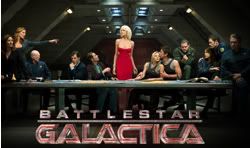
One of the things that I like is that it's different from a lot of science fiction - Star Trek, Star Wars - in that it's very realistic. But there are also a lot of things that are interesting to me as a roboticist - the show's take on robotics is very forward looking, but also takes into account a lot of possibilities that are often ignored in other science fiction stories.
In science fiction stories like Battlestar Galactica or Karel Capek's R.U.R, there's a real fear of artificial intelligence - this popular belief that as soon as machines become intelligent, they become a threat to us, and their first instinct will be to wipe us out. Why do you think people have that knee-jerk reaction?
I agree that hostility to artificial intelligence is most people's response, and I'm not sure why. Basically, I don't think that a robot uprising is the way it's going to go. As robots become more and more complex in their thinking, they're also going to inherit all the aspects that come with increased intelligence. Intelligence is not just being smarter. Humans are more emotional than other animals - they can be depressed, they can question their existence - they are also more compassionate - they can feel empathy, and identify with other humans, whereas animals cannot identify with other animals. So as machines become more intelligent, you'll see all these same things evolve. In fiction, future robotics systems generally do not take this into account. But Battlestar Galactica actually captures some of that idea. The cylons have internal controversy, within themselves as individuals and as a society. There's no reason why an intelligent race would be unified or monolithic in its thinking... Anything with that level of complexity is going to have the same kind of diversity of opinions and passions as humans do.
Any kind of research is driven by funding. The Department of Defense is the biggest sponsor of robotics research. In the end, however, if you're developing AI for robotic systems, you'll run into the same basic questions and problems whether it's for search and rescue missions or for cleaning your house. And I think that the military focus in robotics is going to change. In Japan there's a major push for robotics research into care for the elderly... and we're just now starting to see the development of housecleaning robots, which is something we've been promised for decades, right? These are all an amazing new frontier, and it's proving that there's commercial viability for robot research beyond military applications.
This same idea of self-reflection, and how that's key to what's happening in Battlestar Galactica. The overarching question or issue is that this is a very powerful technology, and there's lots of ethical questions, beyond the technical one. Should we do this? Will it go out of control? One of the nice things about the series, and this particular event, is that they bring these questions out into an open discussion and dialogue. It creates an exchange of ideas between scientists and the public, so we can see together where this technology is going...
Thursday, June 04, 2009
Evolutionary Robotics and Battlestar Galactica: an Interview with Hod Lipson
Here at the Sitrep, we're really excited about next week's phenomenal-sounding event Battlestar Galactica: Cyborgs on the Horizon, at the 92nd Street Y in Manhattan, co-presented with the World Science Festival. Not only is it an opportunity to hear Mary McDonnell and Michael Hogan talk seriously about their characters and the show and the issues that it raises, the panel includes some of the most important scientists in the field of robotics, talking about the state of the field as well as the technical and ethical challenges that come along with it.
I had the opportunity to interview one of the panelists, Dr. Hod Lipson, about Battlestar Galactica, what real-life robot evolution looks like, and what it means to be human. Professor Lipson's work feels stunningly fresh and important; I've tried to provide lots of links throughout the interview, so that you can read up on what he's talking about. I hope that my transcription of our conversation can communicate a fraction of the excitement and energy and passion and accessibility that Dr. Lipson conveys when he discusses his work; if my conversation with him was any indication, next week's event is going to be really astonishing.
===============================================
Are you a fan of Battlestar Galactica?
Absolutely - I was familiar with the old one, but I've only recently been introduced to this one. And I've been watching it pretty much constantly for the past weeks. But I still have a long way to go, so I am trying very hard to avoid finding out what happens.
What do you like about the re-imagined show?
How does its perspective on robotics relate to your own work?
At our lab, we work on evolutionary robotics - this idea that instead of designing robots the traditional way, where engineers work towards a specific concept, we let it happen via evolution. And that's very similar to what we see in Battlestar Galactica - this concept of robot evolution, of robots left to their own devices and improving themselves. Both in terms of the tasks they set for themselves - programming themselves, as opposed to carrying out human commands - and also in their physical forms; in this case, the cylons evolving into a humanoid form.
How does evolutionary robotics work?
We create a primordial soup of components, with bars, and motors, and neurons, and we let them connect and permutate... We set basic tasks, like learning to move. The evolution that we see is unguided; a process of natural selection takes place; initially, all of our robots are completely random, junk, neural networks and limbs connecting in ways that dont make any sense. So they continue to mutate, putting themselves together and taking themselves apart in thousands of random ways. And after hundreds of generations, you might have a single piece that vibrates, and that's an exponential improvement. So that piece will be copied by all the others in the next generation, each one trying out new variations... and more evolutions will take place... And after thousands of generations you get interesting machines that move in blind and simple ways...
[Editor's Note - for a concrete look at evolutionary robotics in action, including video of one of these organically-developed robots learning to walk in a terrifying-but-tragic sort of way, check out this lecture that Dr. Lipson gave in March of 2007]
Twenty years ago, processors were a lot slower, and it would take a couple weeks for each generation... With today's computers, we can go through a thousand generations in a couple of hours. It's conceivable that in a hundred years, with faster processors and simulators, you can see vastly complex mechanical organisms evolving.
Theres a controversy between our evolutionary approach and that of traditional robotics engineering. Traditional roboticists say we can design better robots from first principles, if we work according to a plan. We say that this approach works to a certain extent, but as robots become more and more complicated, we will eventually need to let them evolve and solve their own problems. In our own research, we're seeing robots that are figuring out laws of motion and physics on their own. They catch up, they build knowledge, they exhibit behavior that we would traditionally attribute to human creativity. One concern that people have with evolutionary robotics is that you lose a little bit of control over what you get, and how it behaves.
And we see that in Battlestar Galactica...
This is also reflected very interestingly in the cylons [the raiders] which are metal on the outside and have a bio-organic structure on the inside. That's very much like what we see. Our robots tend to be very organic in structure, with parts spread out throughout the body in a nonstructured way, like organic life forms. So, take a battery for example. A traditional battery is crisp and structured, but the ones that we generate tend to be very unusual, gooey.
These days, it seems like the bulk of research is happening in military robotics. Why is that, and should we be worried?
One of the fascinating things about Battlestar Galactica - and good speculative fiction in general - is that it helps us to answer this really challenging question of "what does it mean to be human." Which is sort of like "who am I," "what are we here for," "what is the meaning of life," and all these very existential questions that we as humans are constantly asking ourselves. How does your work help to answer these questions?
Some of our work is about self reflection - about creating machines that can create models of themselves. They have a sense of self-image, and can think through different scenarios and and evaluate what will happen to it, and what course of action it should follow. Current machines cannot evaluate their own existence. Meta-cognition is said to be unique to humans and some higher primates.
So - robotics in general has two purposes. One is its practical application, the use you put the robot to - taking care of the house, etc. The other is to help us think through questions of human performance, identity and consciousness. Thats why I'm interested in robotics. We all have these questions, and you can talk about it in philosophical or abstract terms... or you can try to build a machine that can do it. When you actually need to build a robot that will do these things that we conceptualize as human, it's very challenging. Because you can't cloak it in abstract terms like creativity anymore. You have to hard code it down to the nuts and bolts. Robotics is a bare-bones way of discussing very challenging and abstract questions. As basic as robot intelligence is now, it's already helping us understand these concepts from a very bottom-up and rigorous way.
What are you going to be talking about at the event next week at the 92nd Street Y - Cyborgs on the Horizon?
-- Sam J. Miller
Subscribe to:
Post Comments (Atom)






No comments:
Post a Comment